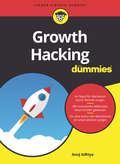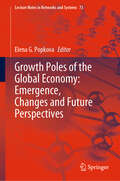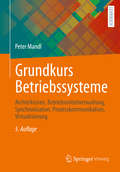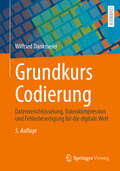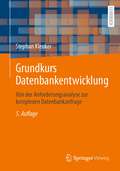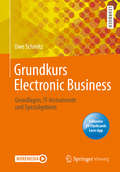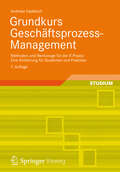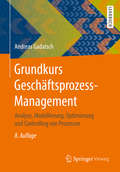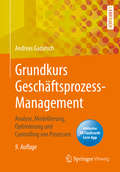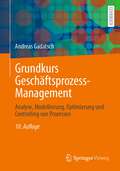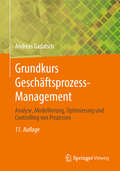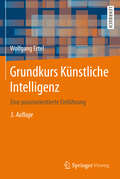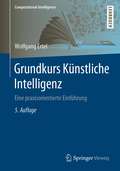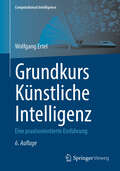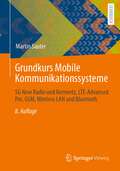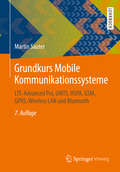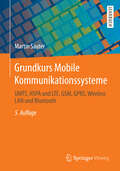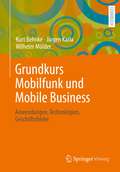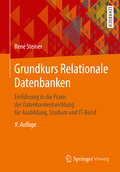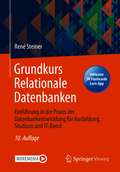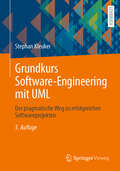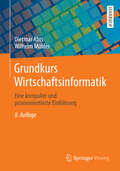- Table View
- List View
Growth Hacker Marketing: A Primer on the Future of PR, Marketing, and Advertising
by Ryan HolidayA Primer on the Future of PR, Marketing and AdvertisingA new generation of megabrands like Facebook, Dropbox, Airbnb, and Twitter haven't spent a dime on traditional marketing. No press releases, no TV commercials, no billboards. Instead, they rely on a new strategy--growth hacking--to reach many more people despite modest marketing budgets. Growth hackers have thrown out the old playbook and replaced it with tools that are testable, trackable, and scalable. They believe that products and businesses should be modified repeatedly until they're primed to generate explosive reactions.Bestselling author Ryan Holiday, the acclaimed marketing guru for American Apparel and many bestselling authors and multiplatinum musicians, explains the new rules and provides valuable examples and case studies for aspiring growth hackers. Whether you work for a tiny start-up or a Fortune 500 giant, if you're responsible for building awareness and buzz for a product or service, this is your road map.
Growth Hacking für Dummies (Für Dummies)
by Anuj AdhiyaWer will das nicht: Marketing betreiben und dafür weniger Geld ausgeben? Growth Hacking wurde genau dafür entwickelt, es sollte Startups helfen, ohne viel Geld zu wachsen. Dieses Buch gibt Ihnen einen Einblick in die Grundlagen des Growth-Hacking-Prozesses. Der Autor erläutert außerdem, wie Sie Kommunikationslinien mit Ihren Kunden eröffnen, wie Sie Testmodelle etablieren und wie Sie sich die nötigen Werkzeuge aneignen, um erfolgreich kostengünstiges Marketing zu betreiben. Zudem geht er noch darauf ein, wie Sie sich das richtige Team zusammenstellen und eine passende Firmenkultur einführen. So ist dieses Buch der verständliche und übersichtliche Start zu Ihrem schnellen Erfolg.
Growth Marketing Strategy: Drive Profits and Sustained Business Growth
by Rose JiaIn an era when growth marketing has become a buzzword for quick fixes, this book provides a clear roadmap for how marketers can move on from short-term hacks and utilize their full marketing funnel to gain and retain customers across any size business in any economic environment. Growth marketing is no longer just a short-term tactical approach suitable only for start-ups and SMEs looking for easy wins. Instead, it has become a real source of long-term sustainable growth for any business, and a strategic approach that can deliver results regardless of economic environment. With marketers under pressure to consistently deliver growth in rapidly changing landscapes, this invaluable guide will provide a clear roadmap so that any marketer can develop a growth marketing strategy that delivers. Packed full of cutting-edge insights from companies like Fujifilm, GoPro, Twitch, Disney, Amazon Grocery, Tesla and American Express, Growth Marketing Strategy gives marketers practical ways to drive their business forward, moving beyond initial organic growth to a strategy that is both sustainable and resilient to changing market conditions. From exploring how to shift the mindset of the team to long-term investment and adaptability, to how your marketing team should be best structured and resourced within your organization to allow your growth marketing team to thrive, this book takes you from the fundamentals of growth marketing to how to apply it and adapt it to any challenge your business faces.
Growth Poles of the Global Economy: Emergence, Changes and Future Perspectives (Lecture Notes in Networks and Systems #73)
by Elena G. PopkovaThe book presents the best contributions from the international scientific conference “Growth Poles of the Global Economy: Emergence, Changes and Future,” which was organized by the Institute of Scientific Communications (Volgograd, Russia) together with the universities of Kyrgyzstan and various other cities in Russia. The 143 papers selected, focus on spatial and sectorial structures of the modern global economy according to the theory of growth poles. It is intended for representatives of the academic community: university and college staff developing study guides on socio-humanitarian disciplines in connection with the theory of growth poles, researchers, and undergraduates, masters, and postgraduates who are interested in the recent inventions and developments in the field. It is also a valuable resource for expert practitioners managing entrepreneurial structures in the existing and prospective growth poles of the global economy as well as those at international institutes that regulate growth poles.The first part of the book investigates the factors and conditions affecting the emergence of the growth poles of the modern global economy. The second part then discusses transformation processes in the traditional growth poles of the global economy under the influence of the technological progress. The third part examines how social factors affect the formation of new growth poles of the modern global economy. Lastly, the fourth part offers perspectives on the future growth of the global economy on the basis of the digital economy and Industry 4.0.
Grundkurs Betriebssysteme: Architekturen, Betriebsmittelverwaltung, Synchronisation, Prozesskommunikation, Virtualisierung
by Peter MandlDas Buch vermittelt in kompakter und leicht verständlicher Form wichtige Grundkonzepte, Verfahren und Algorithmen, die in modernen Betriebssystemen eingesetzt werden. Nach einer Einführung in grundlegende Konzepte und Betriebssystemarchitekturen wird auf die Interruptverarbeitung aus Sicht von Betriebssystemen eingegangen und es werden gängige Techniken zur Verwaltung wichtiger Betriebsmittel wie Prozesse, Threads, Hauptspeicher, Geräte und Dateien sowie wichtige Mechanismen der Koordination, Synchronisation und Kommunikation zwischen Prozessen und Threads vertieft. Ebenso werden die grundlegenden Problemstellungen und Techniken der Betriebssystemvirtualisierung erläutert. Es wird anschaulich mit vielen Bildern dargestellt, welche komplexen Aufgaben ein Betriebssystem zur Verwaltung von Betriebsmitteln sowie für den konkurrierenden Zugriff auf diese bewältigen muss. Der Stoff wird mit vielen Beispielen aus aktuell relevanten Betriebssystemen und Programmiersprachen angereichert. Als Beispiel-Betriebssysteme werden vorwiegend Windows, Unix und Linux herangezogen. Synchronisationsprobleme werden vor allem in der Sprache Java beschrieben. Zu jedem Kapitel ist eine Sammlung von Kontrollfragen zur Nachbearbeitung des Stoffes beigefügt.
Grundkurs Codierung: Datenverschlüsselung, Datenkompression und Fehlerbeseitigung für die digitale Welt
by Wilfried DankmeierDieses Buch bietet aktuelles Wissen zu Codierungsverfahren und behandelt insbesondere die Korrektur von Datenübertragungs-Fehlern über Leitungen und Funk die Verschlüsselung die Datenkompression Ohne deren Einsatz wäre die heutige digitale Kommunikation in Internet, Mobilfunk, Radio und Fernsehen nicht möglich. Das Buch eignet sich besonders zum Einstieg in diese hoch modernen Fachgebiete. Dabei erhält der Leser einen ausführlichen Überblick und erleichtert sich zugleich das Verständnis für die umfangreiche weiterführende Literatur. Es setzt die bisherigen 4 Auflagen in überarbeiteter, bereinigter und mit neuen Verfahren aktualisierter Form fort. Das Buch entstand mit dem Material einer vielfach durchgeführten Vorlesung. Es wendet sich an Studierende der Nachrichten- und Informationstechnik, an Ingenieure, Informatiker und allgemein an alle, die sich für unsere Alltagstechnik interessieren.
Grundkurs Datenbankentwicklung: Von der Anforderungsanalyse zur komplexen Datenbankanfrage
by Stephan KleukerMit diesem Buch erhalten Studierende einen kompakten und praxisorientierten Einstieg, mit dem sie bereits früh im Studium sehr gut zurechtkommen. Die verschiedenen Phasen einer Datenbankentwicklung werden mit ihren Vorgehensweisen, Konzepten und möglichen Problemquellen vorgestellt. Gerade die Anforderungsanalyse und die Möglichkeit zur Erstellung mächtiger SQL-Anfragen werden als besonders praxisrelevante Aspekte betont. Durch die im zweiten Teil detailliert vorgestellte Integration von Datenbanken in die umgebende Software sind Studierende nach der Lektüre in der Lage, in Praxisprojekten erfolgreich mitzuarbeiten. Das Buch deckt inhaltlich eine Einführungsvorlesung vollständig ab. Die 5. Auflage wurde um das Thema JPA (Objekt-Relationale-Persistenz), Trigger in Java ergänzt. Zusätzlich werden Unterschiede zwischen Oracle, Maria DB, SQLite und Apache Derby erläutert. Neben vielen kleinen Beispielen zur Verdeutlichung einzelner Aspekte wird ein durchgehendes Beispiel genutzt. Alle Kapitel schließen mit Wiederholungsfragen und Übungsaufgaben, deren Lösungen online zum Download zur Verfügung stehen.
Grundkurs Electronic Business: Grundlagen, IT-Instrumente und Spezialgebiete
by Uwe SchmitzDieses Lehrbuch erörtert zunächst die Grundlagen elektronischer Geschäftsmodelle und Märkte und analysiert darauf aufbauend gezielt E-Business-Prozesse. Dabei untersucht es die ganzheitliche und umfassende Unterstützung von Prozessen – insbesondere durch IT-Instrumente – im E-Contracting, E-Marketing, E-Customer Relationship Management, E-Procurement sowie E-Payment und stellt die Einführung geeigneter IT-Systeme (E-Procurement-System und E-CRM-System) vor. Neueste Entwicklungen im Bereich Mobile E-Business werden ebenso aufgezeigt wie der Einsatz von Kryptowährungen und Block Chain-Lösungen. Der Leser erhält so einen fundierten Einblick in die verschiedenen Facetten des E-Business unter Berücksichtigung betriebswirtschaftlicher und technischer Aspekte. Neueste technische Entwicklungen werden zur praktikablen Umsetzung von innovativen Lösungen dargestellt. Übungsaufgaben und Lösungen runden das Buch ab und machen es zum optimalen Begleiter für Studium und Selbststudium. Zusätzlich stehen für Leserinnen und Leser über die Springer Nature Flashcards-App digitale Lernkarten zum Buch zur Wissenskontrolle und -vertiefung kostenlos zur Verfügung.
Grundkurs Geschäftsprozess-Management
by Andreas GadatschOhne methodische Grundlagen gibt es keine erfolgreiche Gestaltung und Modellierung von Geschäftsprozessen unter Einsatz betrieblicher Standardsoftware, seien es ERP- oder Workflow-Management-Systeme. Das Buch schlägt die Brücke zwischen den betriebswirtschaftlich-organisatorischen Methoden und deren IT-gestützter Umsetzung. Ausgewählte Praxisbeispiele, Übungen u. v. m. vervollständigen das Werk. Das Buch von Prof. Gadatsch gilt mittlerweile als der "aktuelle Klassiker", DAS maßgebliche Standardwerk zur IT-gestützten Gestaltung von Geschäftsprozessen. Das Buch führt aus einer methodisch-organisatorischen Sicht in das Geschäftsprozessmanagement ein. Neben den rein organisatorischen Aspekten (Prozessanalyse, Prozessmodellierung, Simulation und Restrukturierung der Geschäftsprozesse) wird die technische Unterstützung mit Informationssystemen (ERP-Systeme, Workflow-Management-Systeme u.a.) thematisiert und anhand von Praxisbeispielen vermittelt. Das Werk wurde primär als Lehr- und Übungsbuch für Studenten konzipiert, wird aber auch gerne von Praktikern (Anwender, IT-Experten und Berater) zum "Wissensupdate" eingesetzt. Einige Kapitel wurden in der 7. Auflage aus Platzgründen entfernt. Angesichts der stärkeren Verbreitung der BPMN-Methode wurde der Abschnitt stärker ausgebaut. Ein Vergleich ausgewählter Modellierungsmethoden erlaubt dem Leser eine Orientierung für den Fall, dass er eine für seinen Anwendungsfall passende Methode auswählen möchte.
Grundkurs Geschäftsprozess-Management: Analyse, Modellierung, Optimierung und Controlling von Prozessen
by Andreas GadatschDas Buch schlägt die Brücke zwischen den betriebswirtschaftlich-organisatorischen Methoden und deren IT-gestützter Umsetzung. Prozessmanagement heißt Gestaltung betrieblicher Aufgaben. Neben methodischen Grundlagen bietet das Werk Praxisbeispiele und Übungen. Das Buch von Prof. Gadatsch gilt mittlerweile als der "aktuelle Klassiker", DAS maßgebliche Standardwerk zur IT-gestützten Gestaltung von Geschäftsprozessen.Die achte Auflage wurde vollständig überarbeitet und an die Anforderungen der Digitalisierung angepasst. Das Werk deckt den gesamten „Business Process Management Life-Cycle“ ab. Es behandelt die Entwicklung und das Controlling der Prozessstrategie, die fachliche Modellierung der Prozesse sowie die Unterstützung des Prozessmanagements durch Informationssysteme.
Grundkurs Geschäftsprozess-Management: Analyse, Modellierung, Optimierung und Controlling von Prozessen
by Andreas GadatschDas Buch schlägt die Brücke zwischen den betriebswirtschaftlich-organisatorischen Methoden und deren digitaler Umsetzung, denn Prozessmanagement heißt zunehmend Gestaltung betrieblicher Aufgaben. Neben methodischen Grundlagen bietet das Werk viele Praxisbeispiele und Übungen. Das Buch von Prof. Gadatsch gilt mittlerweile als der "aktuelle Klassiker", DAS maßgebliche Standardwerk zur IT-gestützten Gestaltung von Geschäftsprozessen.Die neunte Auflage wurde überarbeitet und an die Anforderungen der Digitalen Transformation angepasst. Dabei wurden aktuelle Themen wie Agiles Prozessmanagement, Robotic Process Automation (RPA) oder Process Mining integriert. Die Ausführungen zu Cloud Computing wurden an aktuelle Entwicklungen angepasst und erweitert. Außerdem bietet das Kapitel zur Prozessmodellierung neue Beispiele auf Basis der Lehrerfahrungen des Verfassers. Das Werk deckt den gesamten „Business Process Management Life-Cycle“ ab. Es behandelt die Entwicklung und das Controlling der Prozessstrategie, die fachliche Modellierung der Prozesse sowie die Unterstützung des Prozessmanagements durch Informationssysteme. Für die Wissenskontrolle stehen den Leserinnen und Lesern digitale Lernkarten zur Verfügung: Laden Sie die Springer Nature Flashcards-App kostenlos herunter und nutzen Sie exklusives Zusatzmaterial, um Ihr Wissen zu prüfen.
Grundkurs Geschäftsprozess-Management: Analyse, Modellierung, Optimierung und Controlling von Prozessen
by Andreas GadatschDieses Lehrbuch schlägt die Brücke zwischen den betriebswirtschaftlich-organisatorischen Methoden und deren digitaler Umsetzung, denn Prozessmanagement heißt zunehmend Gestaltung betrieblicher Aufgaben. Neben methodischen Grundlagen bietet das Werk viele Praxisbeispiele und Übungen. Das Buch von Prof. Gadatsch gilt mittlerweile als der "aktuelle Klassiker", DAS maßgebliche Standardwerk zur IT-gestützten Gestaltung von Geschäftsprozessen.Die zehnte Auflage wurde überarbeitet und an die Anforderungen der Digitalen Transformation angepasst. Das Prozessmanagement hat sich durch den Trend der Digitalisierung und infolge der Pandemie stark weiterentwickelt. Ein weiterer damit verknüpfter Trend ist die verstärkte Nutzung von Data Science-Methoden für das Prozessmanagement, was auf wissenschaftlichen Konferenzen folgerichtig als "Process Science" bezeichnet wurde. Von besonderer Bedeutung sind auch jüngere Forschungsergebnisse, die unter dem Stichwort „Exploratives Prozessmanagement“ veröffentlicht wurden. Sie zeigen auf, dass die erste Hauptphase des Prozessmanagements eher auf die Optimierung bestehender Prozesse und Geschäftsmodelle ausgerichtet war. An verschiedenen Stellen des Buches wurden neue Praxisbeispiele aufgenommen, so zum Beispiel die Migrationsstrategien für das ERP-System „SAP S/4 HANA“, welches die Basis für viele Industrie- und Dienstleistungsprozesse darstellt. Das Kapitel zur Modellierung von Prozessen wurde aktualisiert und neuere Methoden wie z. B. Business Model Canvas aufgenommen.
Grundkurs Geschäftsprozess-Management: Analyse, Modellierung, Optimierung und Controlling von Prozessen
by Andreas GadatschDieses Lehrbuch schlägt die Brücke zwischen den betriebswirtschaftlich-organisatorischen Methoden und deren digitaler Umsetzung, denn Prozessmanagement heißt zunehmend Gestaltung betrieblicher Aufgaben. Neben methodischen Grundlagen bietet das Werk viele Praxisbeispiele und Übungen. Das Buch von Prof. Gadatsch gilt mittlerweile als der "aktuelle Klassiker", DAS maßgebliche Standardwerk zur IT-gestützten Gestaltung von Geschäftsprozessen. Die elfte Auflage wurde verbessert und an die Anforderungen der Digitalen Transformation angepasst. Ein weiterer damit verknüpfter Trend ist die verstärkte Nutzung von Data Science-Methoden für das Prozessmanagement. Von besonderer Bedeutung sind auch jüngere Forschungsergebnisse, die unter dem Stichwort „Exploratives Prozessmanagement&“ veröffentlicht wurden. Sie zeigen auf, dass die erste Hauptphase des Prozessmanagements eher auf die Optimierung bestehender Prozesse und Geschäftsmodelle ausgerichtet war. An verschiedenen Stellen des Buches wurden neue Praxisbeispiele aufgenommen, so zum Beispiel die Migrationsstrategien für das ERP-System „SAP S/4 HANA&“, welches die Basis für viele Industrie- und Dienstleistungsprozesse darstellt. Das Kapitel zur Modellierung von Prozessen wurde aktualisiert und neuere Methoden wie z. B. Business Model Canvas aufgenommen.
Grundkurs Geschäftsprozess-Management: Methoden und Werkzeuge für die IT-Praxis: Eine Einführung für Studenten und Praktiker
by Andreas GadatschOhne methodische Grundlagen gibt es keine erfolgreiche Gestaltung und Modellierung von Geschäftsprozessen unter Einsatz betrieblicher Standardsoftware, seien es ERP- oder Workflow-Management-Systeme. Das Buch schlägt die Brücke zwischen den betriebswirtschaftlich-organisatorischen Methoden und deren IT-gestützter Umsetzung. Ausgewählte Praxisbeispiele, Übungen u. v. m. vervollständigen das Werk. Das Buch von Prof. Gadatsch gilt mittlerweile als der "aktuelle Klassiker", DAS maßgebliche Standardwerk zur IT-gestützten Gestaltung von Geschäftsprozessen. Das Buch führt aus einer methodisch-organisatorischen Sicht in das Geschäftsprozessmanagement ein. Neben den rein organisatorischen Aspekten (Prozessanalyse, Prozessmodellierung, Simulation und Restrukturierung der Geschäftsprozesse) wird die technische Unterstützung mit Informationssystemen (ERP-Systeme, Workflow-Management-Systeme u.a.) thematisiert und anhand von Praxisbeispielen vermittelt. Das Werk wurde primär als Lehr- und Übungsbuch für Studenten konzipiert, wird aber auch gerne von Praktikern (Anwender, IT-Experten und Berater) zum „Wissensupdate“ eingesetzt. Einige Kapitel wurden in der 7. Auflage aus Platzgründen entfernt. Angesichts der stärkeren Verbreitung der BPMN-Methode wurde der Abschnitt stärker ausgebaut. Ein Vergleich ausgewählter Modellierungsmethoden erlaubt dem Leser eine Orientierung für den Fall, dass er eine für seinen Anwendungsfall passende Methode auswählen möchte.
Grundkurs Künstliche Intelligenz: Eine praxisorientierte Einführung
by Wolfgang Ertel Rudolf Kruse Bernhard Nebel Wolfgang BibelAlle Teilgebiete der KI werden mit dieser Einführung kompakt, leicht verständlich und anwendungsbezogen dargestellt. Hier schreibt jemand, der das Gebiet nicht nur bestens kennt, sondern auch in der Lehre engagiert und erfolgreich vertritt. Von der klassischen Logik über das Schließen mit Unsicherheit und maschinelles Lernen bis hin zu Anwendungen wie Expertensysteme oder lernfähige Roboter. Neben dem umfassenden Einblick in dieses faszinierende Teilgebiet der Informatik gewinnen Sie vertiefte Kenntnisse, z. B. hinsichtlich wichtiger Verfahren zur Repräsentation und Verarbeitung von Wissen. Der Anwendungsbezug steht im Fokus der Darstellung. Viele Übungsaufgaben mit Lösungen sowie strukturierte Verweise auf Literatur und Ressourcen im Web ermöglichen ein effektives und kurzweiliges Selbststudium. Für die 3. Auflage ...
Grundkurs Künstliche Intelligenz: Eine praxisorientierte Einführung (Computational Intelligence)
by Wolfgang ErtelAlle Teilgebiete der KI werden mit dieser Einführung kompakt, leicht verständlich und anwendungsbezogen dargestellt. Hier schreibt jemand, der das Gebiet nicht nur bestens kennt, sondern auch in der Lehre engagiert und erfolgreich vertritt. Von der klassischen Logik über das Schließen mit Unsicherheit und maschinelles Lernen bis hin zu Anwendungen wie Expertensysteme oder lernfähige Roboter. Neben dem umfassenden Einblick in dieses faszinierende Teilgebiet der Informatik gewinnen Sie vertiefte Kenntnisse, z. B. hinsichtlich wichtiger Verfahren zur Repräsentation und Verarbeitung von Wissen. Der Anwendungsbezug steht im Fokus der Darstellung. Viele Übungsaufgaben mit Lösungen sowie strukturierte Verweise auf Literatur und Ressourcen im Web ermöglichen ein effektives und kurzweiliges Selbststudium. Für die 3. Auflage ...
Grundkurs Künstliche Intelligenz: Eine praxisorientierte Einführung (Computational Intelligence)
by Wolfgang ErtelIn diesem Buch werden alle Teilgebiete der KI kompakt, leicht verständlich und anwendungsbezogen vorgestellt. Der Autor kennt das Gebiet nicht nur bestens aus Forschung und praktischer Anwendung, sondern engagiert sich auch erfolgreich in der Lehre. Die Themen reichen von der klassischen Logik über das Schließen mit Unsicherheit und maschinelles Lernen bis hin zu Anwendungen wie Diagnosesysteme, lernfähige Roboter oder Kreativität in der KI. Die 6. Auflage erweitert den Teil über Large Language Models und bietet ein neues Kapitel über die Auswirkungen von KI auf die heutige Gesellschaft. Sie profitieren von dem umfassenden Einblick in dieses faszinierende Teilgebiet der Informatik, wobei, abgesehen von grundlegenden Programmierkenntnissen sowie etwas Mathematik, alle Voraussetzungen für ein gutes Verständnis bereitgestellt werden. Sie gewinnen vertiefte Kenntnisse, z. B. hinsichtlich der wichtigsten Verfahren zur Repräsentation und Verarbeitung von Wissen und in dem immer wichtiger werdenden Gebiet des maschinellen Lernens. Vor allem der Anwendungsbezug steht im Fokus der Darstellung. Viele Übungsaufgaben mit Lösungen sowie eine strukturierte Liste mit Verweisen auf Literatur und Ressourcen im Web ermöglichen ein effektives und kurzweiliges Selbststudium.
Grundkurs Mobile Kommunikationssysteme: 5G New Radio und Kernnetz, LTE-Advanced Pro, GSM, Wireless LAN und Bluetooth
by Martin SauterDieses Buch bietet praxis- und detailgerechtes Wissen zu mobilen Kommunikationssystemen. Es führt klar und verständlich in die Technik und praktische Umsetzung von 5G New Radio und Kernnetz, LTE-Advanced Pro, GSM, GPRS, Wireless LAN und Bluetooth ein. Anhand vieler Beispiele wird fundiertes Wissen vermittelt und aufgezeigt, welche Möglichkeiten und Grenzen die unterschiedlichen Konzepte haben. Für die achte Auflage des Buches wurden alle Kapitel auf den neuesten Stand gebracht und enthalten zusätzlich ausführliche Ergänzungen zu aktuellen Entwicklungen. Dies umfasst z. B. LTE-Advanced Pro Themen wie Carrier Aggregation und Multi-Stream Übertragung (MIMO), neue Details zum Thema Wi-Fi wie z. B. Wi-Fi 6 (802.11ax), die neue WPA-3 Authentifizierung und Protected Management Frames. Wichtigste Ergänzung in dieser Auflage ist das neue Kapitel über 5G New Radio und das 5G Kernnetz.
Grundkurs Mobile Kommunikationssysteme: LTE-Advanced Pro, UMTS, HSPA, GSM, GPRS, Wireless LAN und Bluetooth
by Martin SauterDer Mobilfunk ist nach wie vor einer der sich am schnellsten entwickelnden Zweige der Telekommunikation und so erscheint nun schon die 7. Auflage des umfangreichen Nachschlagewerks. Detailliert und praxisnah aufbereitet liefert es grundlegendes Wissen zu den gängigen mobilen Kommunikationssystemen. Klar und verständlich erläutert der Autor die Technik der verschiedenen Standards für die mobile Datenübertragung, von GSM, GPRS, UMTS und HSPA bis zu LTE und LTE-Advanced Pro und Wirelesse LAN und Bluetooth. Jedes der fünf Kapitel gibt einen fundierten Überblick zum jeweiligen Mobilfunkstandard. Dabei zeigt der Autor an vielen Beispielen, wie die Technik im Detail funktioniert und welche Ideen hinter der Entwicklung der verschiedenen Systeme standen. Anhand von Vergleichen arbeitet er die verschiedenen Möglichkeiten und Grenzen der unterschiedlichen Datenübertragungstechnologien heraus und zeigt, dass sich häufig erst durch eine Kombination mehrerer Systeme eine interessante Anwendung ergibt. Jedes Kapitel schließt mit einem Fragen- und Aufgabenkatalog, mit dem Leser ihren Lernerfolg überprüfen können. Für die siebte Auflage des Buches hat der Autor erneut zahlreiche Überarbeitungen und Ergänzungen vorgenommen. Da heute in der Praxis der Hauptfokus auf dem LTE-System mit seinen schnellen Übertragungsraten liegt, beschreibt das Buch ausführlich neue Entwicklungen in dem Bereich wie LTE-Advanced Pro, Carrier Aggregation Narrowband-IoT und Voice over LTE (VoLTE). Daneben liefert die Neuauflage einen detaillierten Überblick über weitere Neuerungen, zum Beispiel Voice over Wifi (VoWifi) und die Eduroam Authentisierung. Das Buch richtet sich vornehmlich an Studierende der Fachrichtungen Informatik, Elektrotechnik und Nachrichtentechnik, empfiehlt sich aber auch als Praxishandbuch für Ingenieure in der Telekommunikationsbranche und sonstige IT-Experten.
Grundkurs Mobile Kommunikationssysteme: UMTS, HSPA und LTE, GSM, GPRS, Wireless LAN und Bluetooth
by Martin SauterDieses Buch bietet praxis- und detailgerechtes Wissen zu mobilen Kommunikationssystemen. Es führt klar und verständlich in die Technik und praktische Umsetzung von GSM, GPRS, UMTS, HSPA, LTE, Wireless LAN und Bluetooth ein. Anhand vieler Beispiele wird fundiertes Wissen vermittelt und aufgezeigt, welche Möglichkeiten und Grenzen die unterschiedlichen Konzepte haben. Durch viele Vergleiche wird deutlich, welche Kombination der Systeme für die jeweiligen Anwendungen am besten geeignet ist. Für die fünfte Auflage des Buches wurden alle Kapitel auf den neuesten Stand gebracht und enthalten zusätzlich ausführliche Ergänzungen zu aktuellen Entwicklungen. Dies umfasst z.B. die Weiterentwicklung der leitungsvermittelten Sprachtelefonie in GSM und UMTS Netzen, 3G High Speed Packet Access (HSPA+) Erweiterungen, Voice over LTE (VoLTE), sowie neue Details zu Wi-Fi Funktionen wie WPS und 802.11ac.
Grundkurs Mobilfunk und Mobile Business: Anwendungen, Technologien, Geschäftsfelder
by Wilhelm Mülder Kurt Behnke Jürgen KarlaDas Buch eignet sich für Leserinnen und Leser, die eine aktuelle und kompakte Darstellung von Mobile Business benötigen. Gut verständlich und mit vielen Beispielen werden die wichtigsten strategischen, anwendungsbezogenen und technologischen Fragen zur Nutzung von Smartphone, iPhone, iPad und Co. im Unternehmen behandelt. Das Buch richtet sich an Studierende der Wirtschaftswissenschaften, BWL, Wirtschaftsinformatik und Informatik. Es kann sowohl in Bachelor- als auch in Masterstudiengängen genutzt werden. Anhand zahlreicher Fragen und Aufgaben eignet es sich auch zur Klausurvorbereitung und zum Selbststudium.
Grundkurs Relationale Datenbanken
by René SteinerDieses Buch richtet sich an Studierende und IT-ler in Ausbildung und Beruf, die ohne unnötigen Theorieballast die Praxis der Entwicklung von Datenbankapplikationen erlernen möchten. Es ist als anwendungsorientiertes Lehrbuch aufgebaut und eignet sich für den Unterricht sowie zum Selbststudium. Praxisnah und verständlich werden die Themen Datenmodellierung, Datenbankentwicklung und Datenbankbetrieb vermittelt. Darüber hinaus ist eine Einführung in SQL enthalten. Der Leser erhält Zugang zu einem kostenlosen Online-Service, der das Buch ergänzt. Neu in der 9. Auflage sind Anwendungsfälle aus der Praxis im Bereich SQL und ein umfangreiches Fallbeispiel mit Übungsaufgaben.
Grundkurs Relationale Datenbanken: Einführung in die Praxis der Datenbankentwicklung für Ausbildung, Studium und IT-Beruf
by René SteinerDieses Buch richtet sich an Studierende und IT-ler in Ausbildung und Beruf, die ohne unnötigen Theorieballast die Praxis der Entwicklung von Datenbankapplikationen erlernen möchten. Es ist als anwendungsorientiertes Lehrbuch aufgebaut und eignet sich für den Unterricht sowie zum Selbststudium. Praxisnah und verständlich werden die Themen Datenmodellierung, Datenbankentwicklung und Datenbankbetrieb vermittelt. Darüber hinaus ist eine Einführung in SQL enthalten. Der Leser erhält Zugang zu einem kostenlosen Online-Service, der das Buch ergänzt. Neu in der 10. Auflage sind zusätzliche Fragen zum Buch in der Springer Nature Flashcards-App, die sich Leser kostenlos herunterladen können.
Grundkurs Software-Engineering mit UML: Der pragmatische Weg zu erfolgreichen Softwareprojekten
by Stephan KleukerMit der Entwicklung neuer Technologien werden auch die einzelnen Software-Projekte stetig komplexer. Zu analysieren, warum manche Projekte scheitern und andere erfolgreich sind, wird daher immer wichtiger. Dieses Buch ist ein praktischer Leitfaden für die Entwicklung neuer Software. Systematisch beschreibt der Autor die Chancen und Risiken, die einem bei der Entwicklung einer Software begegnen können. Vom gemeinsamen Kundengespräch, das Anforderungen und Ziele der Software festlegt, über die erste Modellierung bis hin zur systematischen Erfassung der Anforderungen zeigt er, wie die unterschiedlichen Prozesse mit Hilfe der UML (Unified Modeling Language) koordiniert werden können. Diese Modellierungssprache hilft, die Ideen des Entwicklers nachzuvollziehen und die Erfahrungen aus erfolgreichen Projekten auf andere Projekte zu übertragen. Neben Maßnahmen zur Qualitätssicherung beschreibt das Buch weitere Ansätze zur Projektplanung und Projektdurchführung und zeigt, wie die Softwareentwicklung in den Gesamtprozess eines Unternehmens eingebettet ist. Zum Verständnis des Buches werden Grundkenntnisse in einer objektorientierten Programmiersprache wie Java, C# oder C++ vorausgesetzt. Durch zahlreiche Wiederholungsfragen und Übungsaufgaben am Ende der Kapitel wird dieses Buch zum idealen Begleiter für Studierende der Informatik und verschiedener Ingenieurswissenschaften. Aber auch erfahrene Entwickler*innen können von den vielen Kommentaren zur Verwendung in der Praxis zur kontinuierlichen Weiterentwicklung des Software-Engineerings profitieren. Die vorliegende fünfte Auflage des bewährten Buches enthält erneut wichtige Erweiterungen, Aktualisierungen und Ergänzungen.
Grundkurs Wirtschaftsinformatik: Eine kompakte und praxisorientierte Einführung
by Dietmar Abts Wilhelm MülderMit unveränderter Dynamik etablieren sich neue IT- Anwendungsmöglichkeiten in unserer Gesellschaft. In Folge sind Unternehmen permanent gezwungen ihre bestehenden Informationssystem auf ihre Eignung, Aktualität und Wirtschaftlichkeit zu überprüfen. Daneben ermöglicht der technologische Fortschritt dabei auch immer wieder die Entwicklung völlig neuartiger IT-Systeme. Der „Grundkurs Wirtschaftsinformatik" beschreibt als Gesamtwerk der Wirtschaftsinformatik neben Hard- und Software-Lösungen auch deren praktische Anwendung und zeigt Wege in der Methodik und Organisation. Fallbeispiele, Übungsteile und Lösungen runden das Themenspektrum ab. Alle Kapitel wurden gründlich überarbeitet und didaktisch verbessert. Neu hinzu-gekommen sind Themen wie z.B. Software as a Service, Ruby on Rails, LTE, WiMAX, NoSQL-Datenbanken, Social Media, App-Stores und Green IT. Zwei neue Kapitel befassen sich ausführlich mit den aktuellen Trends „Mobile Business" und „Soziale Netzwerke". Durch zusätzliche Aufgabenund Wiederholungsfragen lässt sich das Buch noch besser als bisher zum Selbststudium und zu Klausurvorbereitung nutzen. Hinzu gekommen ist auch ein erweiterter Online-Service mit Klausuren und Musterlösungen.

